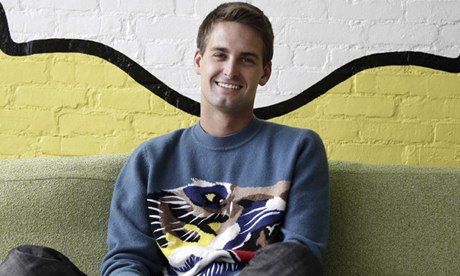
One of my favourite books is John Kenneth Galbraith's The Great Crash, 1929, which, with Keynes's The Economic Consequences of the Peace, is a great example of how an expert can write elegantly about something that is intrinsically complex. Galbraith wrote the (short) book as a diversion from working on The Affluent Society and it became one of his bestsellers. As one edition succeeded another, he added a series of prefaces, in one of which he answered a question that had been put to him by a friend: what was the point of going on and on about such a distant catastrophe? The answer, Galbraith replied, is that memory is the only known antidote to financial folly.
Now spool forward to the present day. A startup called Snapchat, which has no visible revenues, recently turned down an acquisition offer of $3bn from Facebook. I can only think of three possible interpretations of this: the founders are idiots; the founders are geniuses who have a plan that will make Snapchat into a Really Big company; or they believe they can get a better deal from someone else.
Then there's Twitter, a company with much the same financial characteristics but that nevertheless achieved a valuation of $14bn on its IPO and is currently valued at $22bn (£13.39bn). In the old days, companies used to be valued on their price/earnings (P/E) ratio. Nowadays, nobody seems perturbed that there is no E. And the other day, in a nicely ironic development, the Nasdaq index nudged past the 4,000 mark, which was the level it reached when things went pear-shaped in 2000 as the first internet bubble burst.
The bad news, therefore, is that we're in a new technology bubble. If you are impolite enough to mention this in Silicon Valley at the moment, however, then people will cut you dead. That's par for the bubble course. The folks who are caught up in one do not appreciate well-meaning attempts to rain on their parade. When the Celtic tiger was roaring in my beloved homeland, for example, a lone economist named Morgan Kelly dared to say that the tiger had no fur – and was roundly abused for his pains.
The good news is that when the current technology bubble pops there will be less collateral damage than last time. This is largely because it costs so much less to start a technology company nowadays and the funding models (and therefore the investment risks) are different. In the 90s, you needed $5m to get going, whereas $50,000 will do the trick now. And whereas in the late 90s you needed venture capital funding (with all the attendant downsides) just to demonstrate that you might have a viable business, nowadays you only go to a VC for the funding needed to scale up the enterprise into a proper company.
The critical moment in any startup's life is making the transition from idea to commitment. It's the point where you and a mate decide to abandon the day job and work full time on the concept. And here, again, things have changed compared with the 90s, largely thanks to Paul Graham, a celebrated programmer, essayist and investor. In 2005, he and two colleagues came up with the idea for a startup incubator called Y Combinator, which would provide seed money, advice and connections at two three-month programmes every year. In exchange, Graham and co took an average of about 6% of each new company's equity. Thus far, Y Combinator has incubated more than 550 startups, 287 of which are cumulatively worth $11.7bn (£7bn) and include Dropbox, Airbnb, Stripe and Reddit. So Mr Graham has become even richer and the incubator model has spread to other countries, including the UK.
"When I graduated from college in 1986," he writes, "there were essentially two options: get a job or go to grad school. Now there's a third: start your own company. That's a big change. In principle, it was possible to start your own company in 1986, too, but it didn't seem like a real possibility. It seemed possible to start a consulting company or a niche product company, but it didn't seem possible to start a company that would become big. That kind of change, from two paths to three, is the sort of big social shift that only happens once every few generations. I think we're still at the beginning of this one."
So maybe Galbraith was wrong: sometimes, we do learn from our mistakes.

